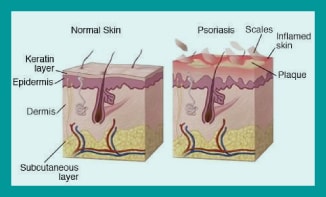Psoriasis Treatment
 Our approach to Psoriasis treatment is to address the underlying issues and not just the symptoms. Deborah is a listed Medical Professional by The National Psoriasis Foundation.
Our approach to Psoriasis treatment is to address the underlying issues and not just the symptoms. Deborah is a listed Medical Professional by The National Psoriasis Foundation.
Psoriasis Treatment: Psoriasis is a common skin condition that speeds up the life cycle of skin cells. It causes cells to build up rapidly on the surface of the skin. The extra skin cells form scales and red patches that are itchy and sometimes painful. It is a chronic disease that often comes and goes. The main goal of Psoriasis treatment is to stop the skin cells from growing so quickly.
Symptoms:
Psoriasis signs and symptoms are different for everyone. Common signs and symptoms include:
- Red patches of skin covered with thick, silvery scales
- Small scaling spots (commonly seen in children)
- Dry, cracked skin that may bleed
- Itching, burning or soreness
- Thickened, pitted or ridged nails
- Swollen and stiff joints
Psoriasis patches can range from a few spots of dandruff-like scaling to major eruptions that cover large areas. Most types of Psoriasis go through cycles, flaring for a few weeks or months, then subsiding for a time or even going into complete remission.
Causes
The cause of Psoriasis isn’t fully understood by mainstream medicine, but it’s thought to be related to an immune system problem with T cells and other white blood cells, neutrophils, in your body. T cells normally travel through the body to defend against foreign substances, such as viruses or bacteria. But if you have Psoriasis, the T cells attack healthy skin cells by mistake, as if to heal a wound or to fight an infection. Overactive T cells also trigger increased production of healthy skin cells, more T cells and other white blood cells, especially neutrophils. These travel into the skin causing redness and sometimes pus in pustular lesions.
Dilated blood vessels in psoriasis-affected areas create warmth and redness in the skin lesions. The process becomes an ongoing cycle in which new skin cells move to the outermost layer of skin too quickly — in days rather than weeks. Skin cells build up in thick, scaly patches on the skin’s surface, continuing until treatment stops the cycle. Just what causes T cells to malfunction in people with Psoriasis isn’t entirely clear. Researchers believe both genetics and environmental factors play a role.
Psoriasis triggers:
Psoriasis typically starts or worsens because of a trigger that you may be able to identify and avoid. Factors that may trigger psoriasis include:
- Infections, such as strep throat or skin infections
- Injury to the skin, such as a cut or scrape, a bug bite, or a severe sunburn
- Stress
- Smoking
- Heavy alcohol consumption
- Vitamin D deficiency
- Certain medications — including lithium, which is prescribed for bipolar disorder, high blood pressure medications such as beta blockers, antimalarial drugs, and iodides
Our Psoriasis Treatment
The treatment will focus on identifying the root causes through bespoke functional medicine testing and addressing these root causes with tailored non parmaceutical medicine treatment to resolve the symptoms in a lasting way.
We also address the gut issues, which are often associated with this condition.
References
If you would like to book an appointment
Contact Deborah’s Medical Secretary for an appointment